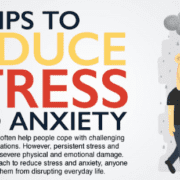Anxiety refers to the body’s natural response to stress. If persistent anxiety goes unaddressed, it may interfere with a person’s everyday life.
What Is Anxiety?
Anxiety triggers worry or fear of potential harm. It causes a rush of adrenalin in the brain, a hormone that activates the body’s “fight-or-flight” response to danger.
How Does Anxiety Affect the Brain?
Generalized Anxiety Disorder has been linked to disruption of the amygdala, which consists of neurons that help the brain process emotions. The amygdala’s basolateral complex is involved in the brain’s fear response. Additionally, the amygdala’s central nucleus manages fear responses in conjunction with the brainstem, hypothalamus, and cerebellum.
What Is an Anxiety Disorder?
An anxiety disorder causes recurring feelings of worry or fear of potential harm, and is characterized by anxiety that is often out of proportion to the situation. In this instance, an anxiety disorder hampers an individual’s ability to function.
What Causes Anxiety Disorders?
Causes of anxiety disorders include:
- Brain Chemistry: An imbalance of various hormones in the brain may contribute to an anxiety disorder.
- Environmental Factors: Relationship and/or family issues and other environmental stressors may result in an anxiety disorder.
- Genetics: A person may be more prone to an anxiety disorder if a blood relative was previously diagnosed with an anxiety disorder.
- Medical Issues: Disease symptoms or medication side effects may lead to an anxiety disorder.
What Are the Symptoms of an Anxiety Disorder?
Common anxiety disorder symptoms include:
- Irritability
- Difficulty concentrating
- Restlessness
- Insomnia
- Fatigue
What Are the Different Types of Anxiety Disorders?
Common types of anxiety disorders include:
- Generalized Anxiety Disorder: Causes anxiety due to a nonspecific life event, object, and/or situation.
- Panic Disorder: Leads to intense feelings of terror and apprehension, as well as panic attacks that result in confusion, dizziness, nausea, and other physical symptoms.
- Social Anxiety Disorder: Results in a fear of negative judgment by others and causes a person to avoid social situations.
Are Anxiety Disorders Common?
Anxiety disorders are the most common mental illness in the United States, according to the Anxiety and Depression Association of America. While they affect 40 million U.S. adults, only 37% of individuals dealing with an anxiety disorder receive treatment.
How Are Anxiety Disorders Treated?
Common anxiety disorder treatments include:
- Self-Care: Stress management exercises and relaxation techniques may help an individual treat anxiety disorder symptoms.
- Counseling: Psychotherapy enables an individual to work with a mental health counselor to find ways to cope with an anxiety disorder.
- Medication: Antidepressants and other medications may help a person manage his or her anxiety disorder symptoms.
Are Anxiety Disorders Preventable?
Common ways to reduce the risk of developing an anxiety disorder include:
- Avoid excess consumption of caffeine and/or alcohol.
- Maintain a nutrient-rich diet that includes fruits, vegetables, and other healthy foods.
- Develop a consistent sleep regimen and prioritize getting a good night’s sleep.
Infographic: What Does Anxiety Look Like in the Brain?
Schedule an Anxiety Disorder Treatment Consultation Today
Achieve Concierge offers a wide range of anxiety disorder treatments. To schedule an anxiety disorder treatment consultation with Achieve Concierge, please contact us online or call us today at (619) 393-5871.




